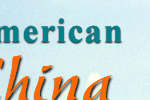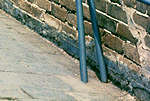 |
 |
 |
 |
 |
 |
 |
 |
 |
 |
 |
 |
 |
 |
 |
 |
|
July 27, 2001 Too Much FaceIt all started when Victor and I were watching CCTV news sweating like swine in our underwear and smoking cheap cigarettes. Victor is a Taiwanese businessman looking for an investment opportunity in Chonqing Municipality – his most recent adventure, a shoe factory in Shanghai, went bust. CCTV was proudly replaying highlights of the Three Tenors' performance while simultaneously glowing in the Olympic light. |
|
"Bah," spat my buddy Victor. "Chinese love face too much." It seems the $10 million performance was so unpopular that the organizers were giving away tickets at the end just to fill the 30,000 seats – the cheapest of those being 800 yuan, a months wage for 80 percent of the population and the most expensive seats were $2000. We'll never know how many of those $2000 dollar buckets were given away as favors to this or that big-time politician. This lavish gala inside the Forbidden City was an effort to court the "western highbrow vote," according to Newsweek columnist Melinda Liu. "The only city to ever make money off of the damn Olympics was Atlanta," says Victor. "Because the organizer was a businessman!" He brought up an important point: western cable networks are reluctant to pay big bucks for the rights to televise the Beijing Olympics because when athletes are doing their thing here, Americans and Europeans will be passed out. Sydney faced the same problem, but then Sydney wasn't in it for the money. The Chinese Government is loudly preaching about the economic love that will be generated in 2008 and the investment that will follow, but it might be safe to assume that Beijing isn't just in it for the money, either. The billions already spent and the billions to be spent won't be made up for with noodles and trinkets. A do-or-die mentality drove the 2008 Olympic bid – Beijing Mayor Liu Jingmin warned that communication between East and West would suffer if Beijing did not win the bid. For a country whose people are thirsty for outside influence and money, desperate to realize financial and international-political ambitions and who speak daily of the opening up of all aspects of Chinese culture, hosting the Olympics is the ultimate attention-getter. WHY THE RUSH?Games and concerts are one thing, but the real test of face vs. reason is China's imminent entry into the WTO. Nicholas Lardy, of the Brookings Institution, has argued in several papers that China needs WTO membership for several important reasons. First, overall growth of the Chinese economy has slowed over the past five years and, in order to step up the pace and keep incomes and living standards on the rise, a further step into the world market is needed. Second, improved living standards and continued growth should help keep the unemployed masses from overthrowing the Communist Party, sustain the leadership's legacy and legitimize their successors. Third, China's economy could benefit from a rules-based, competetive system, which would help re-vamp the state-owned sector and turn the rickety, patchwork economy into an efficient machine. But Lardy also points out what many economists, especially the drooling suits of the U.S. China Business Council, already surmise: the costs of membership are significantly higher than the benefits. A July 13 Inside US Trade report shows that the thorough review of laws and regulations which precedes WTO membership is being eschewed in China's case in favor of an "extensive review system." This change of policy is mostly due to the fact that China refuses to disclose the information needed for a real review of their laws and regulations. Obviously, China knows it isn't ready to comply with all the rules and it is nowhere near competitive enough to meet foreign companies head-on, so why the rush for membership? Face? THINGS WILL HAVE TO CHANGEThe first thing I noticed when I arrived in China were the thousands of shops and stands and hawkers and markets along the streets, in the streets and crawling up out of the streets. My first thought was to compare this with the "free market capitalism" of my own sweet U.S.A. It seemed to me mom and pop shops thrive in Communist China and die a wicked death in free America. Garage doors slide up along every street of every urban area in China to reveal every possible shop imaginable: tires, tools, clothes, leather goods, underwear, mops and kitchen stuff, VCD's etc. and you can find any shop's twin across the street or down a block. My second thought upon reaching China was: "Does anybody sell any of his stuff?" For all the yelling and gesturing, it seemed the plastic bunny toys and glow-in-the-dark wallets and ties and pager parts weren't going anywhere. As Nobel Prize Winner Gao Xingjian writes in his book, Soul Mountain: "It seems opening up a shop is the rave these days in China." Every family has a shop of some sort, and every afternoon from noon to 3 PM the whole family relaxes in front of the shop: smoking, playing mahjong or cards, or just sleeping. "Every shop has ten people sitting or sleeping and one person working," growls Victor. "How do they make any money?" Ol' Vic is just bitter because he experienced Chinese-style business in Shanghai for the first time and he didn't like it. A factory which employed 100 people in Taiwan and made money needed 300 people on the mainland, plus a vast array of "public relations" costs – payoffs, bribe, gifts and such. So everybody has a shop, but the place is run-down, overstaffed, dirty and serves up low quality goods. The kind of shop where you wake up the boss, step over his mangy mutt to point at the nails and hammer, pay, then go home and proceed to bust every nail. The last nail is tough enough to bust the hammer. All the quality goods go overseas (face again) while the scrap stays here. I used tools made in China while working on hydraulics on a boat in Alaska and the skipper praised them to high heaven. I can't count how many screwdrivers I've bent since I've been here. Mainland Chinese have a lot of time off. Usually, a few fellas can smoke and watch while one works, then it's lunch time until 3 PM and the day ends at 5:30 PM for dinner. There are just too many people and not enough work. Every Chinese I meet asks me how much I make. It's the most important thing for every person here: how much money? But the cutthroat competitive spirit which brings activists into the streets in Western countries hasn't hit many parts of China. Business here seems to be more of an exercise in consensus-building, making buddies, getting drunk and signing contracts, exchanging informal gifts and back-scratching. I wonder if Swedish CEO's are prepared to present a bottle of wine, then drink it with a horde of Chinese, screaming "ganbei" ("Dry your glass!"). I also wonder what will happen to Old Deng, his ugly dog and his dusty tire shop if, say, Firestone were to move in with uniforms, advertising, spic-and-span floors and racks of perfectly sorted goods. "Mainland Chinese aren't competitive enough," scoffs Vic. "They don't have what it takes to compete with foreign businesses. WTO is not a good idea." As I've written before, the East might be in a good position to compete, but the dusty garage-door shops of the rest of the nation are probably not ready. And Victor lost his money in Shanghai – the glittering gem of the East Coast. |
Text-only printable version of this article Sascha Matuszak
is a teacher living and working in China. His articles have appeared
in the South China Morning Post, the Minnesota Daily,
and elsewhere. His exclusive Antiwar.com column appears Tuesdays. Archived columns Sailing
Towards World Significance China's
Youth Revolution |
THE POWER OF THE PENIncidentally, the pit of filth across from the Marriot Hotel that I described in "Culture of Pollution" has suddenly been deemed a matter of importance by the Chongqing Planning Commission. Tractors and bulldozers were humming along piling up usables and separating the feces from the fence poles late last week. The move to remove the smelly eyesore has delighted local garbage pickers who can now move with relative ease throughout the whole complex, digging and scavenging with renewed relish. Please Support Antiwar.comSend contributions to Antiwar.com or
Contribute Via our Secure Server |
|
